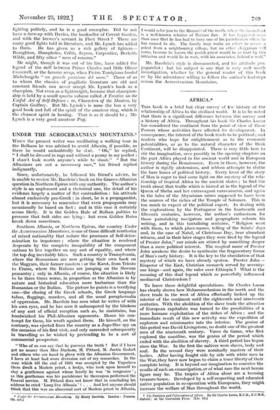UNDER THE ACROCERAUNIAN MOUNTAINS.* WHEN the present writer was meditating
a walking tour in the Balkans he was advised to avoid Albania, if possible, as there he would undoubtedly be shot. " Oh," he replied, " I shall be dressed in rags and without a penny in my pocket : I shan't look worth anyone's while to shoot." " But the Albanians are not a mercenary race," his friend replied indignantly.
Since, unfortunately, he followed his friend's advice, he is unable to review Mr. Baerlein's book on the Graeco-Albanian question in Northern Epirus with any authority. The author's style is an unpleasant and a rhetorical one, the detail of his evidence largely a matter of flat contradiction : his attitude almost exclusively pro-Greek : in short, he is a propagandist, but it is necessary to remember that even propaganda may occasionally be based on fact ; and in this case it certainly seems likely. It is the Golden Rule of Balkan politics to presume that both sides arc lying : but even Golden Rules break down sometimes.
Southern Albania, or Northern Epirus, the country Under the Acroceraunian Mountains, is one of those difficult territories of mixed nationality that reduce the processes of Self-deter- mination to impotence ; where the situation is rendered desperate by the complete incapability of the component nations to live together on any sort of equality, and where the top dog inevitably bites. Such a country is Transylvania, where the Rumanians are now getting their own back on the Magyars, their former masters : or the Karst, from Trieste to Fiume, where the Italians are jumping on the Slovene peasantry ; only in Albania, of course, the situation is likely to be three times worse, in proportion as the Albanian is by nature and historical education more barbarous than the Rumanian or the Italian. The picture he paints is a terrifying one—the closing of the Greek schools, the Greek language taboo, floggings, murders, and all the usual paraphernalia of oppression. Mr. Baerlein has seen what he writes of with his own eyes, and he has seen it unhampered by the blinkers of any sort of official reception such as, he maintains, has hoodwinked his Phil-Albanian opponents. Hence his con- tempt for them, his wrath against them. He himself, on the contrary, was ejected from the country as a Jugo-Slav spy on the occasion of his first visit, and only succeeded subsequently in travelling as he wished by pretending to be a sort of commercial prospector.
" Who of us can say that he purveys the truth I But if I have got no nearer than Miss Durham, M. Pittard, M. Justin Godart and others who are hand in glove with the Albanian Government, I have at least had more diversion out of my researches. In the tone which till the end of 1921 was occupied by the Yugoslays there dwelt a Moslem priest, a hodja, who took upon himself to slay a gentleman against whose family he was ` in vengeance ' ; as this gentleman was his parishioner he thereupon performed the funeral service. M. Pittard does not know that in concluding his address he cried ' Long live Albania ' ! . . . And lest anyone should think that this was an abnormal sort of Moslem priest in Albania,
• nuke the eemeeraunian Mountains. By Henry Bacrlein, London: Parsons. 16s. net.]
I would refer you to the Krasni6i of the north, where the incumbent is a well-known relative of Bairam Zur. It has happened more than once that he has had to bury one of his parishioners whom he has caused to die. The family may make an effort to secure a priest from a neighbouring village, but no other clergyman will come, because he knows the parish priest would be so hurt by this intrusion and would lie in wait, with his associates, behind a wall."
Mr. Baerlein's style is disconnected, and his attitude pro. pagandist : but his subject is one that is very well worth investigation, whether by the general reader of this book or by the adventurer willing to follow the author's footsteps across the Acroceraunian Mountains.










































 Previous page
Previous page